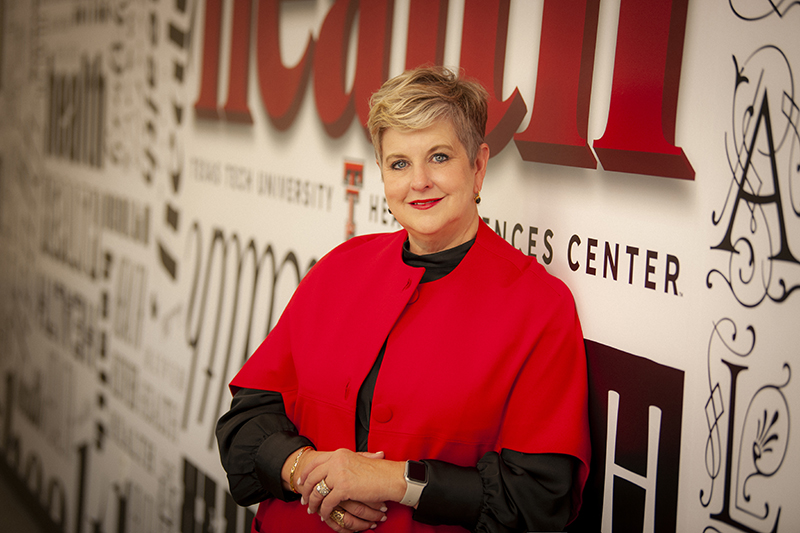
TTUHSC President Lori Rice-Spearman reflects on her time in the Family and Consumer Sciences Education doctoral program
Lori Rice-Spearman, Ph.D., is the ninth president of Texas Tech University Health Sciences Center (TTUHSC) and the first female president in the Texas Tech University System. Rice-Spearman graduated from Texas Tech's Family and Consumer Sciences Education doctoral program in 2010.
Rice-Spearman joined TTUHSC in 1987 and has held multiple leadership positions since. From associate dean for Learning Outcomes and Assessments and chair of the Department of Laboratory Sciences and Primary Care to the dean of the School of Health Professions and associate provost, leading her to become provost and chief academic officer —a passion for healthcare education paved the way to her current role as TTUHSC president.
"I knew that if I wanted to continue to grow my impact administratively that I needed a doctorate to do that," Rice-Spearman said. "My passion has always been access to healthcare—that has been my driving force. From the time I entered health education to what I do today, that is a core value for me."
When Rice-Spearman found Family and Consumer Sciences Education (FCSE) at Texas Tech, she realized the program offered the FCSE Ph.D. with a focus on healthcare education. Rice-Spearman spent her time in the program researching ways to further access health care and build healthy communities.
"It has always aligned perfectly with my desire around educating people," Rice-Spearman explained. "Going through and learning how to write health education pieces at an appropriate level—one of the challenges we have as clinicians and healthcare providers is we don't always use vocabulary that's appropriate to the population that we're trying to impact."
For Rice-Spearman, the FCSE doctoral program offered the opportunity to do just that. Essential skills like writing for healthcare education and understanding how to develop community programs and curriculum were critical elements for a future at TTUHSC.
Looking back, Rice-Spearman remembers her cohort of fellow graduate students as a diverse group who all made the experience unique.
"We were a very diverse cohort from all different aspects in family consumer sciences education," Rice-Spearman said. "It was the experience with that cohort and learning our different perspectives—we would have a very engaged conversation during the curriculum. The benefit of this particular doctoral program is this faculty-led debate that we had regularly with a very diverse group of students. I think FCSE is known for their diverse groups that they have within their doctoral programs."
Faculty members like the late Virginia "Ginny" Felstehausen made quite the mark on Rice-Spearman.
"Ginny had a huge impact on my career, as well as my decision to come to the College of Human Sciences. As you know, Dr. ’Ginny’ has since passed. But she was my mentor. She's the one who got me going. I actually have her regalia that was passed on to me that I wear for all graduations. A second individual who also was a wonderful mentor was Dr. Sue Couch; she was one of those that held all of us graduate students to a very high standard. You knew that when you had a dissertation that had been reviewed by Dr. Sue Couch, it was something to be proud of. Of course, Dr. Karen Alexander, was always a wonderful cheerleader, helping me get through the process."
Rice-Spearman also credits former Dean Linda Hoover and Kitty Harris, Ph.D., for being mentors in her journey to a Ph.D. from Texas Tech.
With a full-time faculty position at TTHSC, a family at home, it became quite the juggling act between mother, wife, graduate student, and employee roles. That busy lifestyle became something to bond over for Rice-Spearman and her classmates. A class taught by Felstehausen became one of Rice-Spearman's most treasured memories in graduate school.
"She decided that we were going to get to know each other's culture. Every Wednesday night, you had to bring a dish that described the culture you grew up in. I'm still friends with some of those individuals that I went through that cohort with. It was really a wonderful bonding experience and we supported each other, we celebrated when one of us would defend our dissertation—it was just a really wonderful experience."
Although she says she didn't grow up wanting to become a university president, Rice-Spearman has led TTUHSC like she was born for it, facing unique challenges brought about by the COVID-19 pandemic with poise and that passion for healthcare education driving her forward.
"One of the things that we are focused on as a university is finding the opportunities for collaboration," Rice Spearman said. "My team hears me say this all the time—but I believe that collaboration is the cradle for innovation. And so, we're trying to bring together diverse groups of individuals, not just across our university, but in all the communities where we are, in both private and public partnerships, to really dig into what can we do when we collaborate and how can we innovate?"
Whether collaborations exist inside Texas Tech or in the community and beyond, access to healthcare will remain fueled by innovation under Rice-Spearman's leadership. The latest project stems from telehealth advancements.
"Our other big initiative that we're very excited about is our Institute for Telehealth Innovation and Technology. We've been engaged in telehealth for about three decades. But we feel like we hold all the keys to research, new clinical opportunities in digital health, and then also expanding our reach for access to healthcare. Those are our passions."
